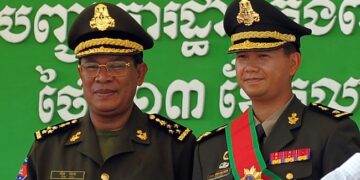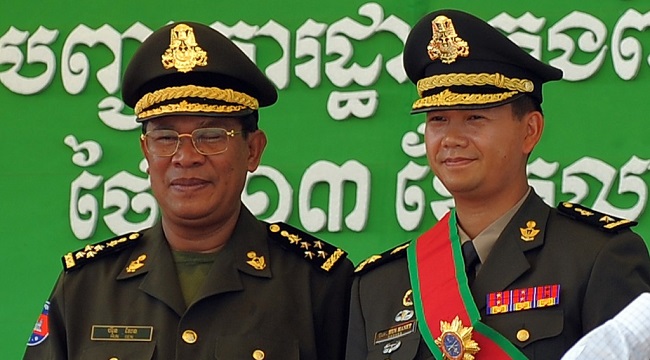Arrangements have been concluded for a national election int Cambodia this weekend, with the Prime Minister, Hun Sen insisting on eventually handing power to his eldest son after 38 years in office.
Sen, 70, who has been in power since 1985 has not announced a timeframe for his dynastic succession, indicating that he may continue to wield influence even after standing down.
The election coming up on Sunday is widely deemed a sham as opposition parties and critics say 30 years after UN-brokered peace accords which ended decades of bloody conflict, Cambodian democracy is in a sorry state.
“Nobody can block the steps forward of Hun Sen or Hun Manet,” AFP quoted the prime minister as telling voters in June.
“After Hun Sen, it will be Hun Manet”, his eldest son.
According to AFP report, while no fixed date has been given for a transfer of power, Hun Manet, 45, has taken on a number of his father’s campaign duties this year.
In a highly symbolic gesture at a rally for the ruling Cambodian People’s Party (CPP) this month, Hun Sen passed the party flag to Hun Manet, who led a crowd of supporters on a march through Phnom Penh.
Hun Manet has also travelled around the country to preside over ceremonies and meet soldiers, workers and CPP members, repeating his father’s campaign mantras of peace and development.
“As long as the CPP continues to lead the country, can keep the peace and can keep balance, we all live with happiness,” he said in a clip posted to Telegram this month.
Phil Robertson of Human Rights Watch told AFP that the prospect of a dynastic handover “makes Cambodia look more like North Korea than a genuine democracy”.
Hun Sen has five children and has carved out political roles for all three of his sons, with the most senior responsibilities entrusted to his eldest.
Hun Manet, already a member of the CPP’s powerful permanent committee, will contest a parliamentary seat this weekend for the first time.
He has served as commander of the Royal Cambodian Army since 2018 and met with foreign dignitaries and world leaders including President Xi Jinping of China — Cambodia’s main ally and benefactor.
Hun Sen’s politics are shaped by his experiences of revolution and war as a young man during the genocidal Khmer Rouge regime.
Those privations moulded him into one of the most effective — and most ruthless — politicians of his generation and thrust him into the prime ministership in 1985, aged just 32.
He has since consolidated his power by co-opting, jailing, sidelining or effectively exiling any opponents.
By contrast, his son was raised in luxury and educated abroad, including at the US military academy West Point.




































